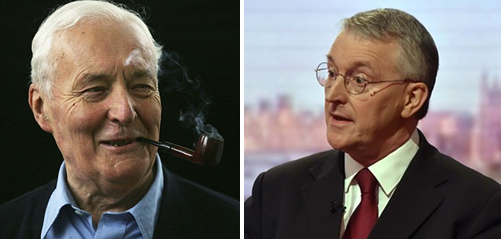Try to see it my way
Do I have to keep on talking till I can’t go on?
While you see it your way
Run the risk of knowing that our love may soon be gone
Think of what you’re saying
You can get it wrong and still you think that it’s alright
Think of what I’m saying
We can work it out and get it straight, or say good night
Well done, voters of Oldham! Labour candidate Jim McMahon comfortably won with 62% of the vote. UKIP came a distant second; the Tories share of the vote halved to 9%.
This result doesn’t fit with the establishment narrative of the week’s events in politics. David Cameron led a (nearly) united Tory win in Parliament with a comfortable majority in favour of bombing Syria. Labour were hopelessly divided as shadow cabinet ministers defied their leader and 67 Labour MPs voted with the government. Labour, as predicted, confirmed they were “unelectable”.
Father and Son
By all accounts, the best speech in the “Bomb Syria” Parliamentary debate was made by Shadow Foreign Secretary, Hilary Benn. I heard the speech in full: I recommend that you do too: click here. No matter that I disagree with his final conclusions, there is a great deal in the speech with which I do agree. It contains many arguments that hold much sway. Benn’s speech is eloquent, passionate and full of humanity and compassion for the suffering of others. It is totally in keeping with the traditions and values of the Labour Party over its history.

What would his dad have made of the speech? I would imagine that the late Tony Benn would have found much to admire and to be proud of his son for the speech. I suspect that they would have had in impassioned argument over the conclusions – from a position of mutual love and respect.
During his lifetime, the establishment meted out the most vitriolic barrage of hatred against Tony Benn. He was that most detestable apostate: a class traitor. Eton-educated and heir to a hereditary peerage, he renounced the latter. He genuinely believed in the principles of democratic legitimacy: he would only serve in Parliament if the people voted for him, not through some inherited privilege. No wonder he was such a hate figure for his political opponents.
Debate and Decision
It has been obvious for some time that both main parties are divided on the issue of bombing Daesh in Syria, with Labour more evenly split than the Tories. It was notable that Tory dissenters from the government line included ex-military personnel and the chair of the parliamentary committee closest to the subject. Put simply, the anguished debate, mainly on the Labour side, grappled with two issues. Firstly, the idea that “something must be done” to stop Daesh’s murderous activities was agreed by all. But the idea that “bombing will only make matters worse” was one which profoundly divided the “for” and “against” camps. There was much historical precedent for the second assertion. David Cameron’s claims about 70,000 moderate opposition troops are simply not credible; the Vienna ceasefire talks are making painfully slow progress.
David Cameron, to his credit, allowed a full day of parliamentary time for the debate. The speeches were made, to a very large degree, in a spirit of anguished wrestling with the propositions and of respect for the opponents’ position. However, Cameron has, at the time of writing, still not apologised for his earlier remarks that those who differed from his view were “a bunch of terrorist sympathisers” and “a threat to national security”. These low, despicable personal attacks were not worthy of the postholder of Prime Minister. Cameron’s smooth façade occasionally slips and the result is not attractive. Jeremy Corbyn, on the other hand, has stated his opinions from a consistent set of principles and respect for others.
Labour’s Oldham Win
This brings us back to the first electoral test of opinion since the general election: the Oldham West by-election result. Under the orthodox view, after what was reported as Labour’s “worst” week for years, they should have been humiliated in the polls. Instead, they increased their share of the vote. It seems the voters of Oldham are more intelligent than the orthodox view gives them credit for. Instead of seeing Labour as a party riven by factions tearing the party apart, they saw a group of people grappling with a nearly impossible to grasp dilemma, and doing so in an intelligent and principled way.

Contrast this with the petulant reaction of UKIP’s Nigel Farage, with his comments about “electoral fraud” and vote-rigging of postal votes. The Oldham result would have still been a decisive Labour win if all the postal votes had been discounted. Farage’s behaviour demonstrates all the intellectual standards and emotional maturity of the school playground bully. The moment anyone stands up to him, he goes crying to teacher.
Farage and Cameron, Benn and Corbyn this week provide a neat illustration of the basic difference between left and right in politics. For the left, there’s a deep conviction of the need for collaboration and cooperation. This includes the necessity, when the time is opportune, to talk to those with whom you disagree and to try to reach some accommodation or understanding. For the right, it’s all about me and getting my own way. The former is based upon an optimistic view of human nature, the latter on a more cynical, pessimistic view.
Hope or fear. Engagement or a sneer. We Can Work It Out or My Way. You choose.